HNB2105 Essay: Non-Pharmacological Treatments for Major Depression
VerifiedAdded on 2023/03/30
|7
|1422
|428
Essay
AI Summary
This essay examines non-pharmacological therapies for Major Depressive Disorder (MDD), a prevalent and disabling form of depression. It highlights the limitations of pharmacological treatments and emphasizes the effectiveness of non-pharmacological approaches, particularly dietary therapy and yoga. The essay defines MDD and reviews various non-pharmacological treatments, including cognitive behavioral therapy, light therapy, and herbal remedies, with a focus on dietary and yoga interventions. Dietary therapy's role in managing MDD is discussed, highlighting the importance of diet management, traditional dietary patterns like the Mediterranean diet, and the consumption of omega-3 fatty acids. The essay also emphasizes the avoidance of processed foods and the significance of nutrients like omega-3 fatty acids, magnesium, B-vitamins, zinc, and vitamin D. Furthermore, the essay explores yoga as an effective alternative treatment for MDD, citing studies on the positive relationship between yoga practice and improved MDD conditions. The conclusion emphasizes the value of non-pharmacological therapies, such as yoga and dietary interventions, as crucial alternatives in treating MDD, supported by multiple studies, leading to the improvement of MDD symptoms.
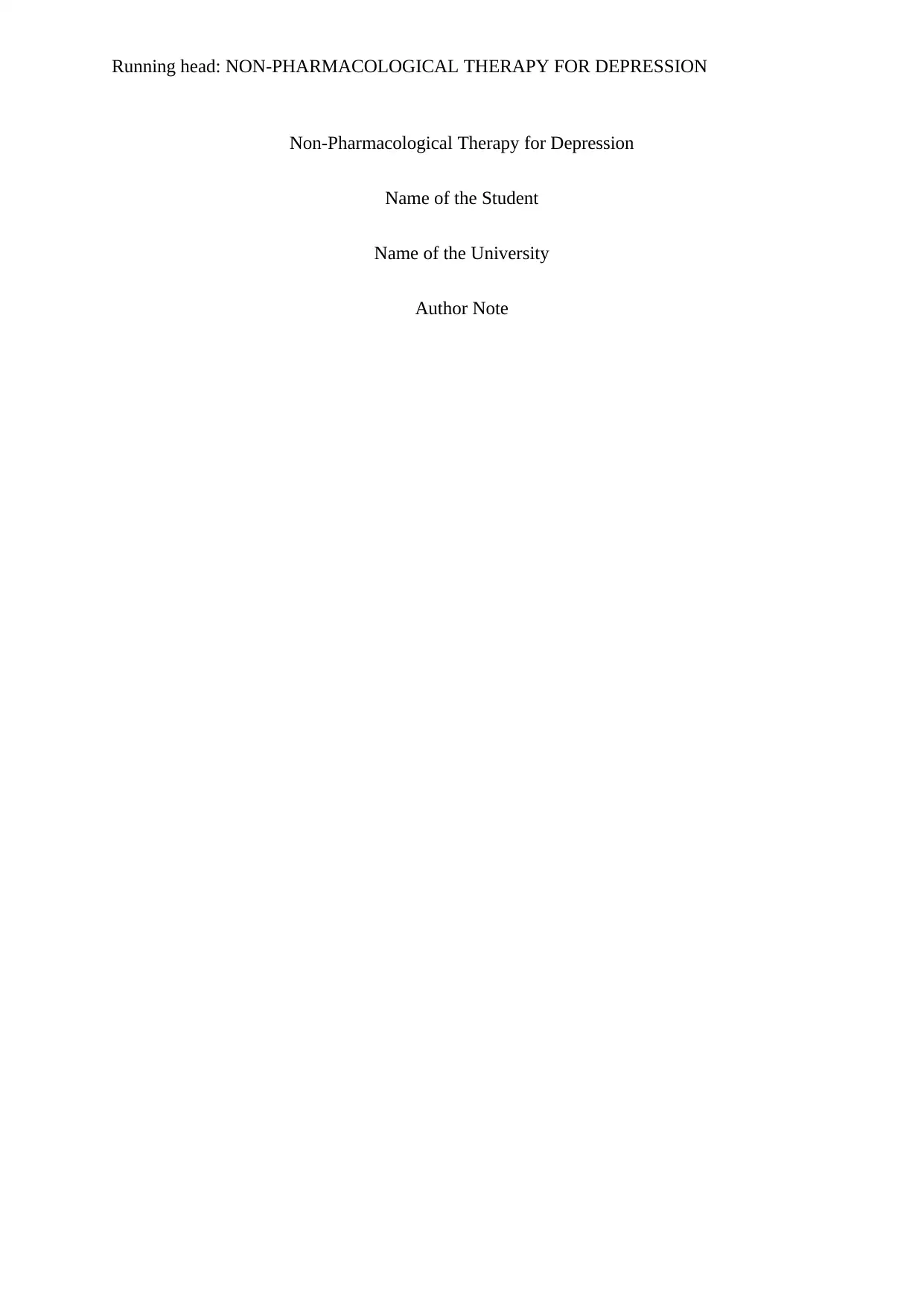
Running head: NON-PHARMACOLOGICAL THERAPY FOR DEPRESSION
Non-Pharmacological Therapy for Depression
Name of the Student
Name of the University
Author Note
Non-Pharmacological Therapy for Depression
Name of the Student
Name of the University
Author Note
Paraphrase This Document
Need a fresh take? Get an instant paraphrase of this document with our AI Paraphraser
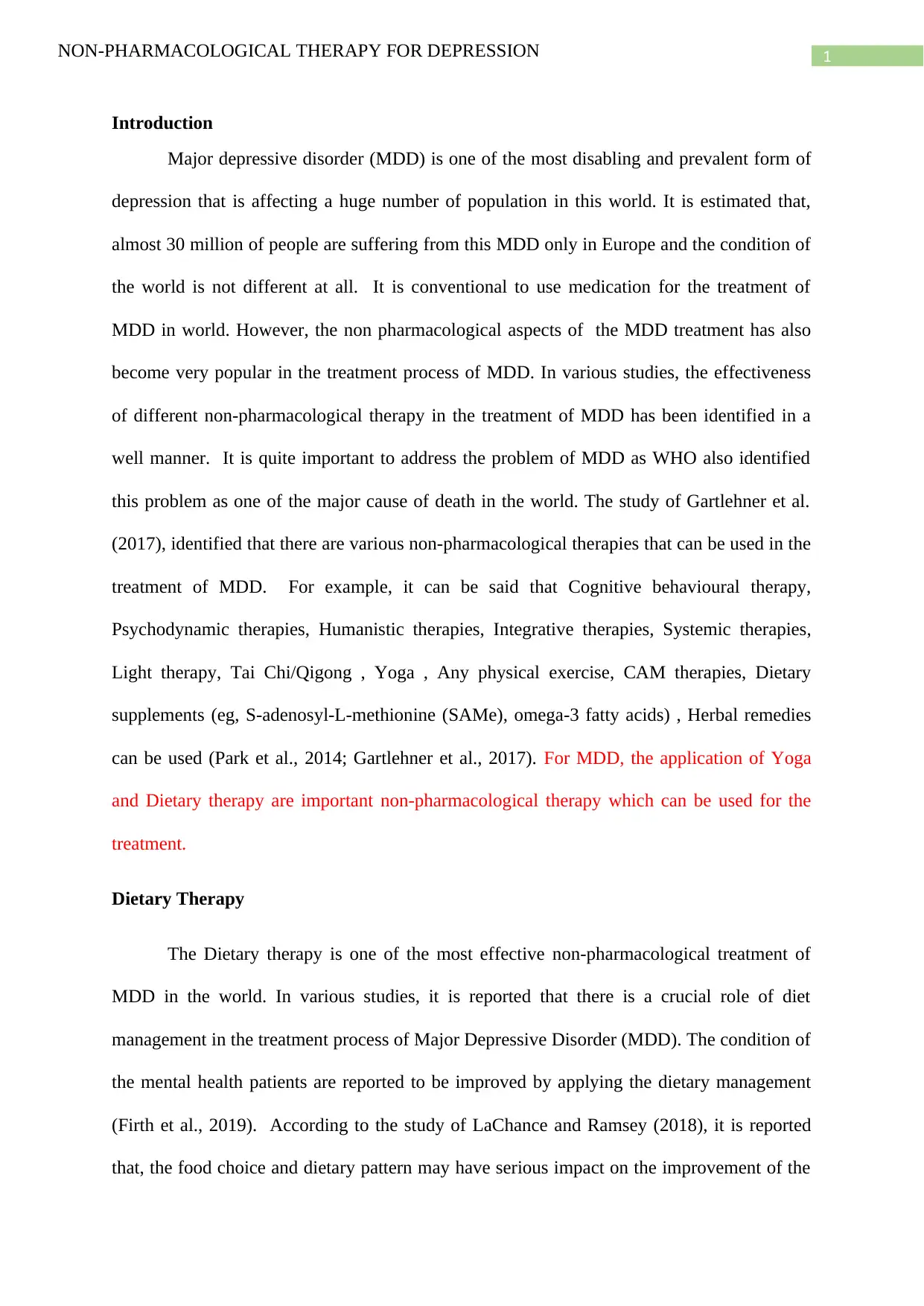
1NON-PHARMACOLOGICAL THERAPY FOR DEPRESSION
Introduction
Major depressive disorder (MDD) is one of the most disabling and prevalent form of
depression that is affecting a huge number of population in this world. It is estimated that,
almost 30 million of people are suffering from this MDD only in Europe and the condition of
the world is not different at all. It is conventional to use medication for the treatment of
MDD in world. However, the non pharmacological aspects of the MDD treatment has also
become very popular in the treatment process of MDD. In various studies, the effectiveness
of different non-pharmacological therapy in the treatment of MDD has been identified in a
well manner. It is quite important to address the problem of MDD as WHO also identified
this problem as one of the major cause of death in the world. The study of Gartlehner et al.
(2017), identified that there are various non-pharmacological therapies that can be used in the
treatment of MDD. For example, it can be said that Cognitive behavioural therapy,
Psychodynamic therapies, Humanistic therapies, Integrative therapies, Systemic therapies,
Light therapy, Tai Chi/Qigong , Yoga , Any physical exercise, CAM therapies, Dietary
supplements (eg, S-adenosyl-L-methionine (SAMe), omega-3 fatty acids) , Herbal remedies
can be used (Park et al., 2014; Gartlehner et al., 2017). For MDD, the application of Yoga
and Dietary therapy are important non-pharmacological therapy which can be used for the
treatment.
Dietary Therapy
The Dietary therapy is one of the most effective non-pharmacological treatment of
MDD in the world. In various studies, it is reported that there is a crucial role of diet
management in the treatment process of Major Depressive Disorder (MDD). The condition of
the mental health patients are reported to be improved by applying the dietary management
(Firth et al., 2019). According to the study of LaChance and Ramsey (2018), it is reported
that, the food choice and dietary pattern may have serious impact on the improvement of the
Introduction
Major depressive disorder (MDD) is one of the most disabling and prevalent form of
depression that is affecting a huge number of population in this world. It is estimated that,
almost 30 million of people are suffering from this MDD only in Europe and the condition of
the world is not different at all. It is conventional to use medication for the treatment of
MDD in world. However, the non pharmacological aspects of the MDD treatment has also
become very popular in the treatment process of MDD. In various studies, the effectiveness
of different non-pharmacological therapy in the treatment of MDD has been identified in a
well manner. It is quite important to address the problem of MDD as WHO also identified
this problem as one of the major cause of death in the world. The study of Gartlehner et al.
(2017), identified that there are various non-pharmacological therapies that can be used in the
treatment of MDD. For example, it can be said that Cognitive behavioural therapy,
Psychodynamic therapies, Humanistic therapies, Integrative therapies, Systemic therapies,
Light therapy, Tai Chi/Qigong , Yoga , Any physical exercise, CAM therapies, Dietary
supplements (eg, S-adenosyl-L-methionine (SAMe), omega-3 fatty acids) , Herbal remedies
can be used (Park et al., 2014; Gartlehner et al., 2017). For MDD, the application of Yoga
and Dietary therapy are important non-pharmacological therapy which can be used for the
treatment.
Dietary Therapy
The Dietary therapy is one of the most effective non-pharmacological treatment of
MDD in the world. In various studies, it is reported that there is a crucial role of diet
management in the treatment process of Major Depressive Disorder (MDD). The condition of
the mental health patients are reported to be improved by applying the dietary management
(Firth et al., 2019). According to the study of LaChance and Ramsey (2018), it is reported
that, the food choice and dietary pattern may have serious impact on the improvement of the
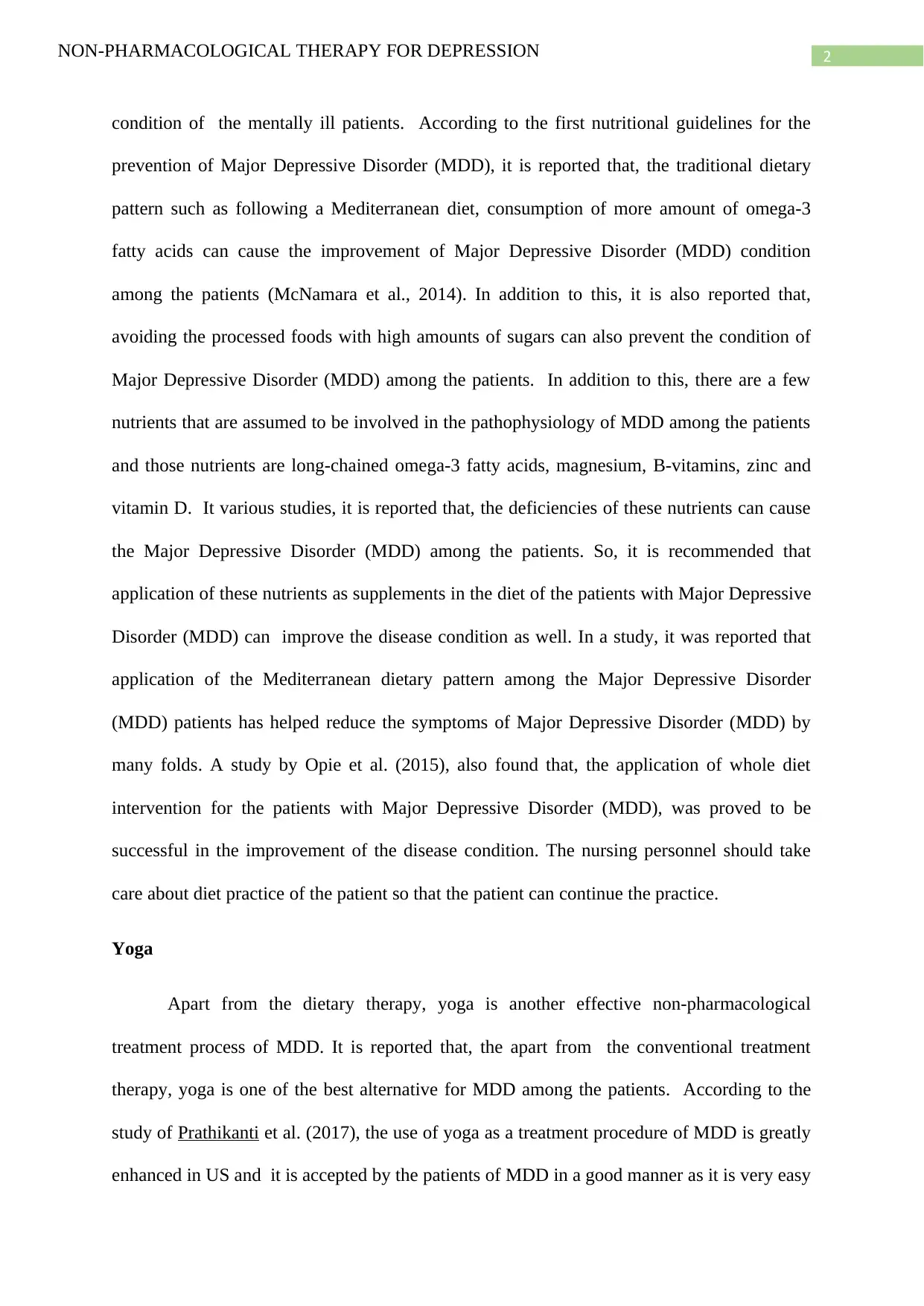
2NON-PHARMACOLOGICAL THERAPY FOR DEPRESSION
condition of the mentally ill patients. According to the first nutritional guidelines for the
prevention of Major Depressive Disorder (MDD), it is reported that, the traditional dietary
pattern such as following a Mediterranean diet, consumption of more amount of omega-3
fatty acids can cause the improvement of Major Depressive Disorder (MDD) condition
among the patients (McNamara et al., 2014). In addition to this, it is also reported that,
avoiding the processed foods with high amounts of sugars can also prevent the condition of
Major Depressive Disorder (MDD) among the patients. In addition to this, there are a few
nutrients that are assumed to be involved in the pathophysiology of MDD among the patients
and those nutrients are long-chained omega-3 fatty acids, magnesium, B-vitamins, zinc and
vitamin D. It various studies, it is reported that, the deficiencies of these nutrients can cause
the Major Depressive Disorder (MDD) among the patients. So, it is recommended that
application of these nutrients as supplements in the diet of the patients with Major Depressive
Disorder (MDD) can improve the disease condition as well. In a study, it was reported that
application of the Mediterranean dietary pattern among the Major Depressive Disorder
(MDD) patients has helped reduce the symptoms of Major Depressive Disorder (MDD) by
many folds. A study by Opie et al. (2015), also found that, the application of whole diet
intervention for the patients with Major Depressive Disorder (MDD), was proved to be
successful in the improvement of the disease condition. The nursing personnel should take
care about diet practice of the patient so that the patient can continue the practice.
Yoga
Apart from the dietary therapy, yoga is another effective non-pharmacological
treatment process of MDD. It is reported that, the apart from the conventional treatment
therapy, yoga is one of the best alternative for MDD among the patients. According to the
study of Prathikanti et al. (2017), the use of yoga as a treatment procedure of MDD is greatly
enhanced in US and it is accepted by the patients of MDD in a good manner as it is very easy
condition of the mentally ill patients. According to the first nutritional guidelines for the
prevention of Major Depressive Disorder (MDD), it is reported that, the traditional dietary
pattern such as following a Mediterranean diet, consumption of more amount of omega-3
fatty acids can cause the improvement of Major Depressive Disorder (MDD) condition
among the patients (McNamara et al., 2014). In addition to this, it is also reported that,
avoiding the processed foods with high amounts of sugars can also prevent the condition of
Major Depressive Disorder (MDD) among the patients. In addition to this, there are a few
nutrients that are assumed to be involved in the pathophysiology of MDD among the patients
and those nutrients are long-chained omega-3 fatty acids, magnesium, B-vitamins, zinc and
vitamin D. It various studies, it is reported that, the deficiencies of these nutrients can cause
the Major Depressive Disorder (MDD) among the patients. So, it is recommended that
application of these nutrients as supplements in the diet of the patients with Major Depressive
Disorder (MDD) can improve the disease condition as well. In a study, it was reported that
application of the Mediterranean dietary pattern among the Major Depressive Disorder
(MDD) patients has helped reduce the symptoms of Major Depressive Disorder (MDD) by
many folds. A study by Opie et al. (2015), also found that, the application of whole diet
intervention for the patients with Major Depressive Disorder (MDD), was proved to be
successful in the improvement of the disease condition. The nursing personnel should take
care about diet practice of the patient so that the patient can continue the practice.
Yoga
Apart from the dietary therapy, yoga is another effective non-pharmacological
treatment process of MDD. It is reported that, the apart from the conventional treatment
therapy, yoga is one of the best alternative for MDD among the patients. According to the
study of Prathikanti et al. (2017), the use of yoga as a treatment procedure of MDD is greatly
enhanced in US and it is accepted by the patients of MDD in a good manner as it is very easy
⊘ This is a preview!⊘
Do you want full access?
Subscribe today to unlock all pages.

Trusted by 1+ million students worldwide
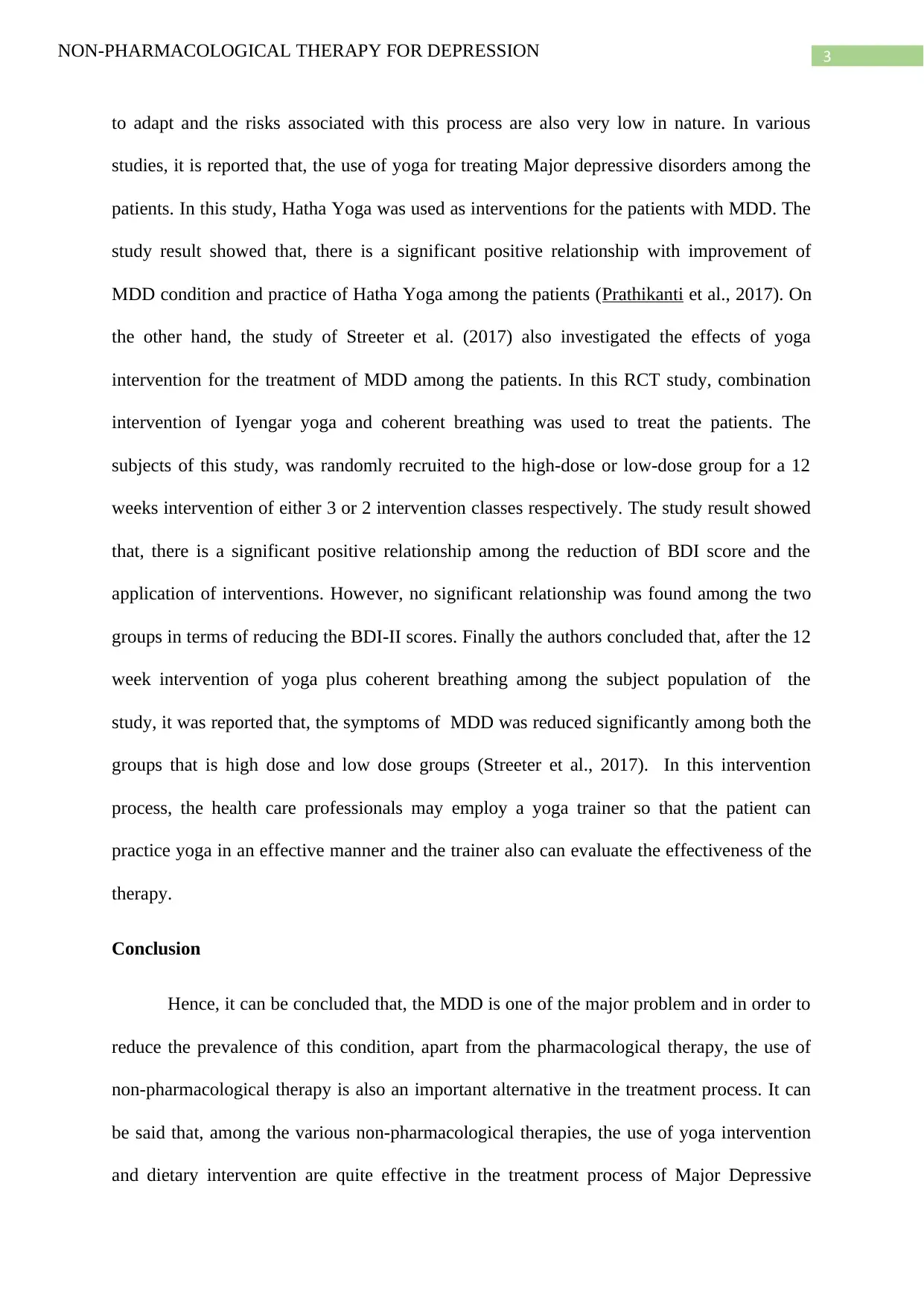
3NON-PHARMACOLOGICAL THERAPY FOR DEPRESSION
to adapt and the risks associated with this process are also very low in nature. In various
studies, it is reported that, the use of yoga for treating Major depressive disorders among the
patients. In this study, Hatha Yoga was used as interventions for the patients with MDD. The
study result showed that, there is a significant positive relationship with improvement of
MDD condition and practice of Hatha Yoga among the patients (Prathikanti et al., 2017). On
the other hand, the study of Streeter et al. (2017) also investigated the effects of yoga
intervention for the treatment of MDD among the patients. In this RCT study, combination
intervention of Iyengar yoga and coherent breathing was used to treat the patients. The
subjects of this study, was randomly recruited to the high-dose or low-dose group for a 12
weeks intervention of either 3 or 2 intervention classes respectively. The study result showed
that, there is a significant positive relationship among the reduction of BDI score and the
application of interventions. However, no significant relationship was found among the two
groups in terms of reducing the BDI-II scores. Finally the authors concluded that, after the 12
week intervention of yoga plus coherent breathing among the subject population of the
study, it was reported that, the symptoms of MDD was reduced significantly among both the
groups that is high dose and low dose groups (Streeter et al., 2017). In this intervention
process, the health care professionals may employ a yoga trainer so that the patient can
practice yoga in an effective manner and the trainer also can evaluate the effectiveness of the
therapy.
Conclusion
Hence, it can be concluded that, the MDD is one of the major problem and in order to
reduce the prevalence of this condition, apart from the pharmacological therapy, the use of
non-pharmacological therapy is also an important alternative in the treatment process. It can
be said that, among the various non-pharmacological therapies, the use of yoga intervention
and dietary intervention are quite effective in the treatment process of Major Depressive
to adapt and the risks associated with this process are also very low in nature. In various
studies, it is reported that, the use of yoga for treating Major depressive disorders among the
patients. In this study, Hatha Yoga was used as interventions for the patients with MDD. The
study result showed that, there is a significant positive relationship with improvement of
MDD condition and practice of Hatha Yoga among the patients (Prathikanti et al., 2017). On
the other hand, the study of Streeter et al. (2017) also investigated the effects of yoga
intervention for the treatment of MDD among the patients. In this RCT study, combination
intervention of Iyengar yoga and coherent breathing was used to treat the patients. The
subjects of this study, was randomly recruited to the high-dose or low-dose group for a 12
weeks intervention of either 3 or 2 intervention classes respectively. The study result showed
that, there is a significant positive relationship among the reduction of BDI score and the
application of interventions. However, no significant relationship was found among the two
groups in terms of reducing the BDI-II scores. Finally the authors concluded that, after the 12
week intervention of yoga plus coherent breathing among the subject population of the
study, it was reported that, the symptoms of MDD was reduced significantly among both the
groups that is high dose and low dose groups (Streeter et al., 2017). In this intervention
process, the health care professionals may employ a yoga trainer so that the patient can
practice yoga in an effective manner and the trainer also can evaluate the effectiveness of the
therapy.
Conclusion
Hence, it can be concluded that, the MDD is one of the major problem and in order to
reduce the prevalence of this condition, apart from the pharmacological therapy, the use of
non-pharmacological therapy is also an important alternative in the treatment process. It can
be said that, among the various non-pharmacological therapies, the use of yoga intervention
and dietary intervention are quite effective in the treatment process of Major Depressive
Paraphrase This Document
Need a fresh take? Get an instant paraphrase of this document with our AI Paraphraser
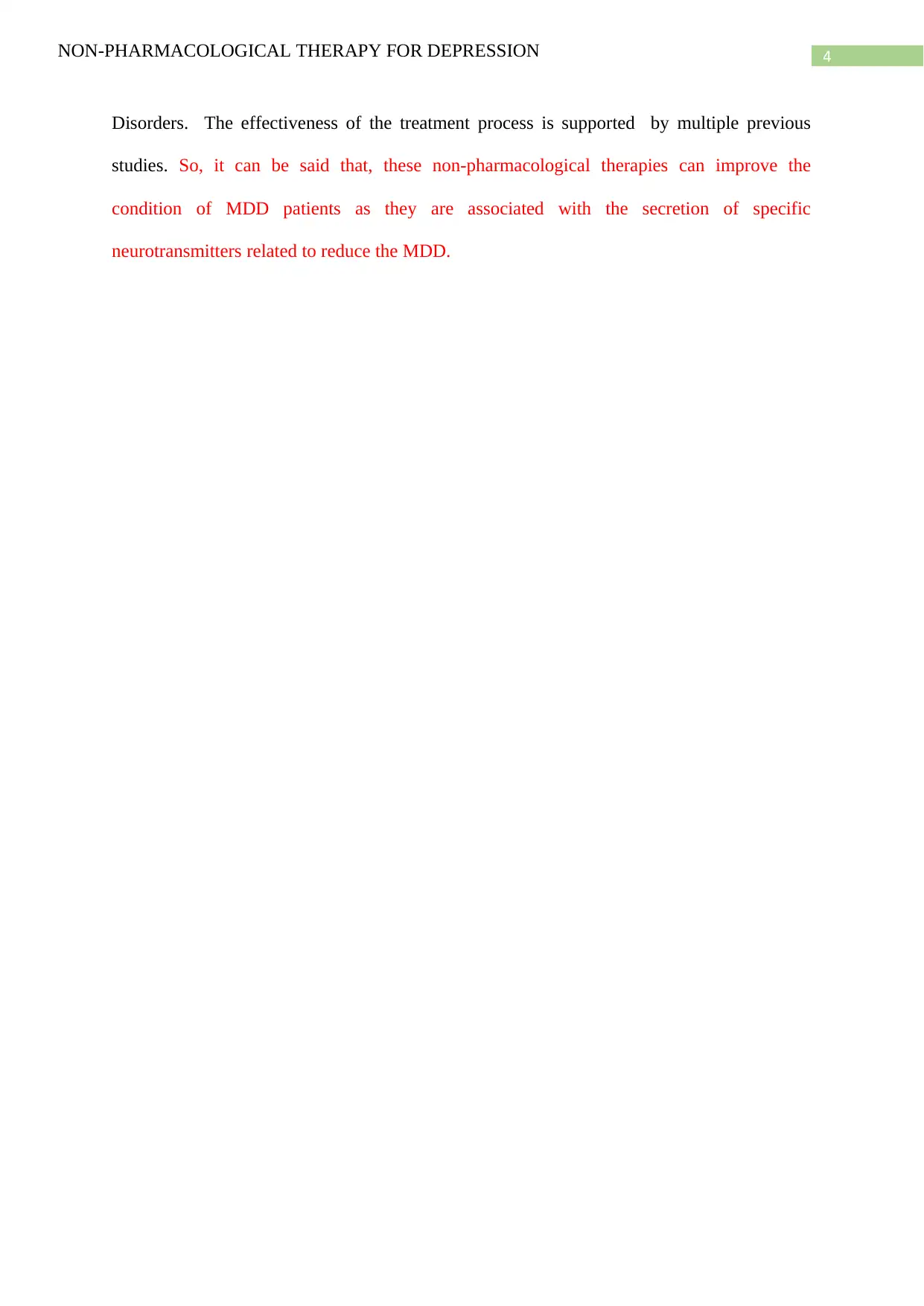
4NON-PHARMACOLOGICAL THERAPY FOR DEPRESSION
Disorders. The effectiveness of the treatment process is supported by multiple previous
studies. So, it can be said that, these non-pharmacological therapies can improve the
condition of MDD patients as they are associated with the secretion of specific
neurotransmitters related to reduce the MDD.
Disorders. The effectiveness of the treatment process is supported by multiple previous
studies. So, it can be said that, these non-pharmacological therapies can improve the
condition of MDD patients as they are associated with the secretion of specific
neurotransmitters related to reduce the MDD.
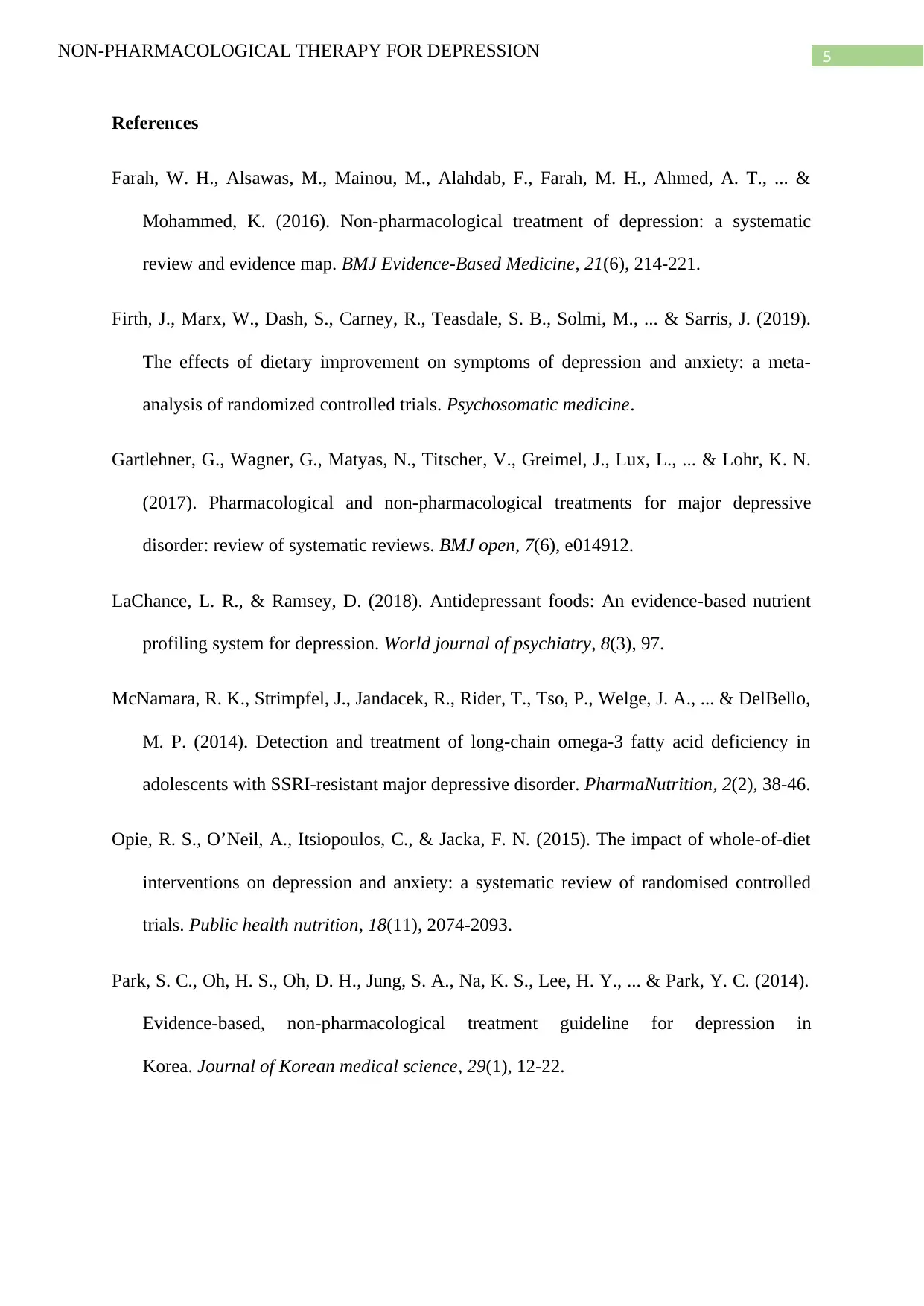
5NON-PHARMACOLOGICAL THERAPY FOR DEPRESSION
References
Farah, W. H., Alsawas, M., Mainou, M., Alahdab, F., Farah, M. H., Ahmed, A. T., ... &
Mohammed, K. (2016). Non-pharmacological treatment of depression: a systematic
review and evidence map. BMJ Evidence-Based Medicine, 21(6), 214-221.
Firth, J., Marx, W., Dash, S., Carney, R., Teasdale, S. B., Solmi, M., ... & Sarris, J. (2019).
The effects of dietary improvement on symptoms of depression and anxiety: a meta-
analysis of randomized controlled trials. Psychosomatic medicine.
Gartlehner, G., Wagner, G., Matyas, N., Titscher, V., Greimel, J., Lux, L., ... & Lohr, K. N.
(2017). Pharmacological and non-pharmacological treatments for major depressive
disorder: review of systematic reviews. BMJ open, 7(6), e014912.
LaChance, L. R., & Ramsey, D. (2018). Antidepressant foods: An evidence-based nutrient
profiling system for depression. World journal of psychiatry, 8(3), 97.
McNamara, R. K., Strimpfel, J., Jandacek, R., Rider, T., Tso, P., Welge, J. A., ... & DelBello,
M. P. (2014). Detection and treatment of long-chain omega-3 fatty acid deficiency in
adolescents with SSRI-resistant major depressive disorder. PharmaNutrition, 2(2), 38-46.
Opie, R. S., O’Neil, A., Itsiopoulos, C., & Jacka, F. N. (2015). The impact of whole-of-diet
interventions on depression and anxiety: a systematic review of randomised controlled
trials. Public health nutrition, 18(11), 2074-2093.
Park, S. C., Oh, H. S., Oh, D. H., Jung, S. A., Na, K. S., Lee, H. Y., ... & Park, Y. C. (2014).
Evidence-based, non-pharmacological treatment guideline for depression in
Korea. Journal of Korean medical science, 29(1), 12-22.
References
Farah, W. H., Alsawas, M., Mainou, M., Alahdab, F., Farah, M. H., Ahmed, A. T., ... &
Mohammed, K. (2016). Non-pharmacological treatment of depression: a systematic
review and evidence map. BMJ Evidence-Based Medicine, 21(6), 214-221.
Firth, J., Marx, W., Dash, S., Carney, R., Teasdale, S. B., Solmi, M., ... & Sarris, J. (2019).
The effects of dietary improvement on symptoms of depression and anxiety: a meta-
analysis of randomized controlled trials. Psychosomatic medicine.
Gartlehner, G., Wagner, G., Matyas, N., Titscher, V., Greimel, J., Lux, L., ... & Lohr, K. N.
(2017). Pharmacological and non-pharmacological treatments for major depressive
disorder: review of systematic reviews. BMJ open, 7(6), e014912.
LaChance, L. R., & Ramsey, D. (2018). Antidepressant foods: An evidence-based nutrient
profiling system for depression. World journal of psychiatry, 8(3), 97.
McNamara, R. K., Strimpfel, J., Jandacek, R., Rider, T., Tso, P., Welge, J. A., ... & DelBello,
M. P. (2014). Detection and treatment of long-chain omega-3 fatty acid deficiency in
adolescents with SSRI-resistant major depressive disorder. PharmaNutrition, 2(2), 38-46.
Opie, R. S., O’Neil, A., Itsiopoulos, C., & Jacka, F. N. (2015). The impact of whole-of-diet
interventions on depression and anxiety: a systematic review of randomised controlled
trials. Public health nutrition, 18(11), 2074-2093.
Park, S. C., Oh, H. S., Oh, D. H., Jung, S. A., Na, K. S., Lee, H. Y., ... & Park, Y. C. (2014).
Evidence-based, non-pharmacological treatment guideline for depression in
Korea. Journal of Korean medical science, 29(1), 12-22.
⊘ This is a preview!⊘
Do you want full access?
Subscribe today to unlock all pages.

Trusted by 1+ million students worldwide
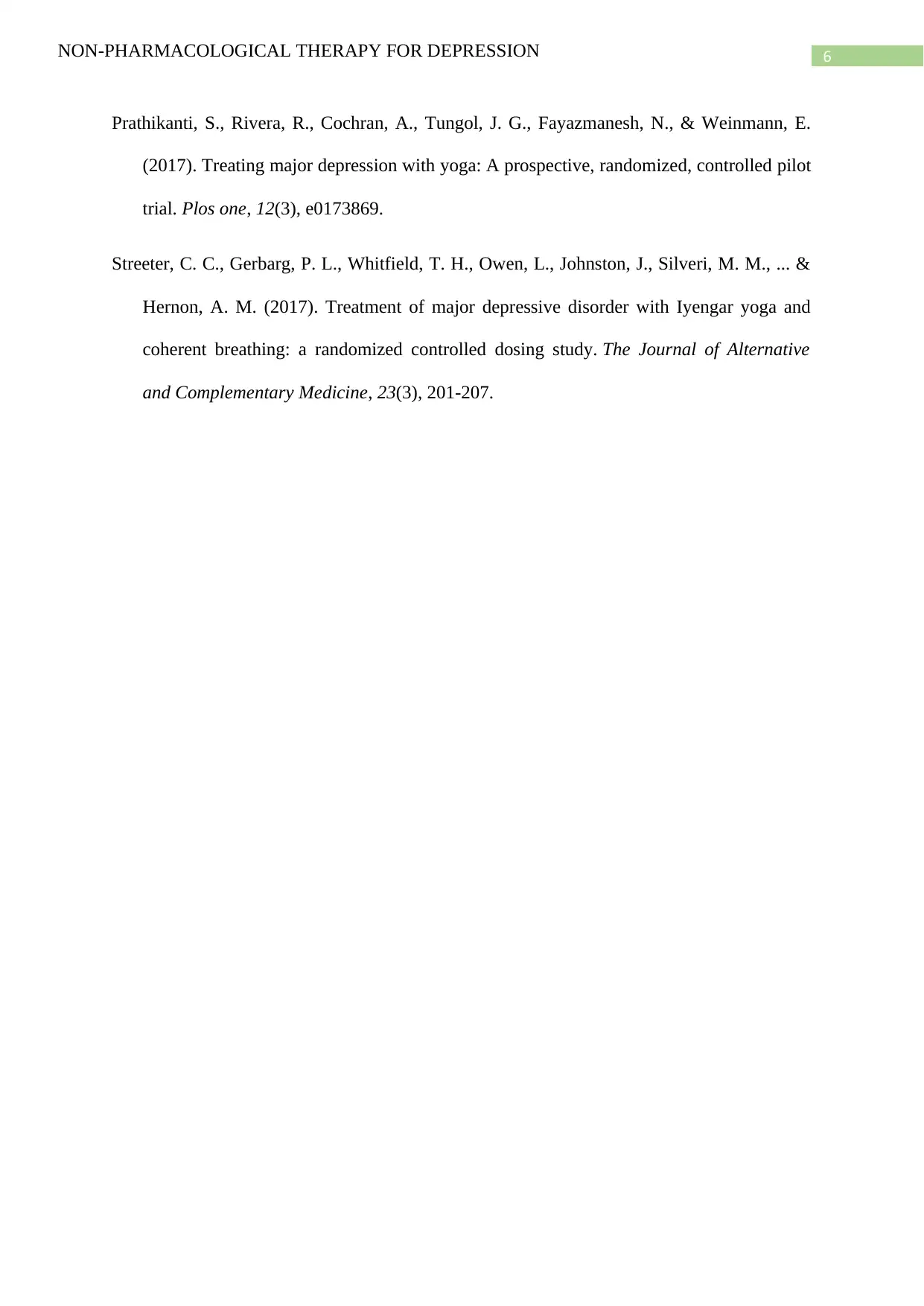
6NON-PHARMACOLOGICAL THERAPY FOR DEPRESSION
Prathikanti, S., Rivera, R., Cochran, A., Tungol, J. G., Fayazmanesh, N., & Weinmann, E.
(2017). Treating major depression with yoga: A prospective, randomized, controlled pilot
trial. Plos one, 12(3), e0173869.
Streeter, C. C., Gerbarg, P. L., Whitfield, T. H., Owen, L., Johnston, J., Silveri, M. M., ... &
Hernon, A. M. (2017). Treatment of major depressive disorder with Iyengar yoga and
coherent breathing: a randomized controlled dosing study. The Journal of Alternative
and Complementary Medicine, 23(3), 201-207.
Prathikanti, S., Rivera, R., Cochran, A., Tungol, J. G., Fayazmanesh, N., & Weinmann, E.
(2017). Treating major depression with yoga: A prospective, randomized, controlled pilot
trial. Plos one, 12(3), e0173869.
Streeter, C. C., Gerbarg, P. L., Whitfield, T. H., Owen, L., Johnston, J., Silveri, M. M., ... &
Hernon, A. M. (2017). Treatment of major depressive disorder with Iyengar yoga and
coherent breathing: a randomized controlled dosing study. The Journal of Alternative
and Complementary Medicine, 23(3), 201-207.
1 out of 7
Related Documents
Your All-in-One AI-Powered Toolkit for Academic Success.
+13062052269
info@desklib.com
Available 24*7 on WhatsApp / Email
![[object Object]](/_next/static/media/star-bottom.7253800d.svg)
Unlock your academic potential
Copyright © 2020–2026 A2Z Services. All Rights Reserved. Developed and managed by ZUCOL.





